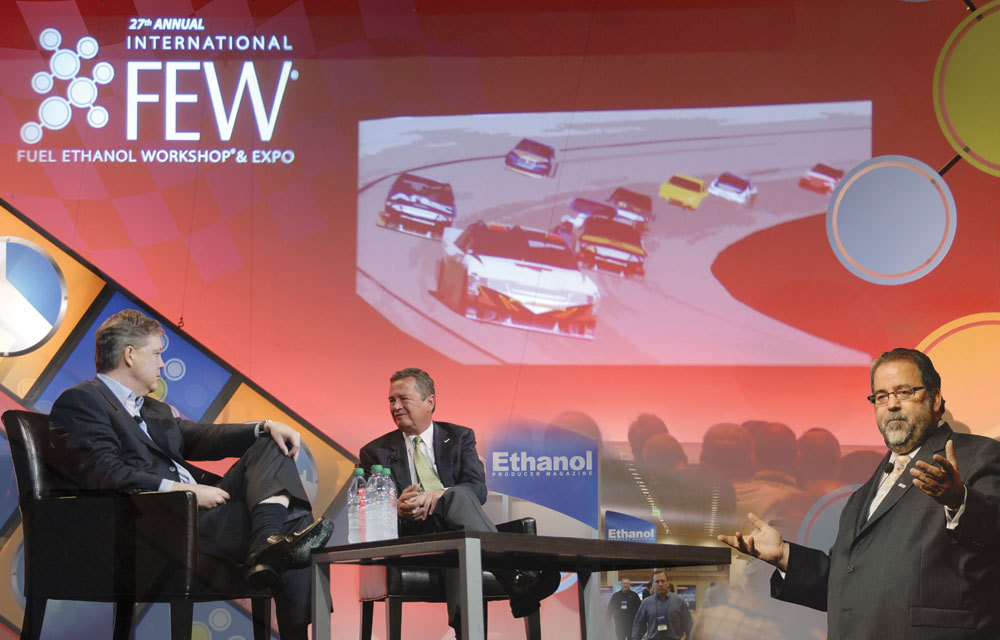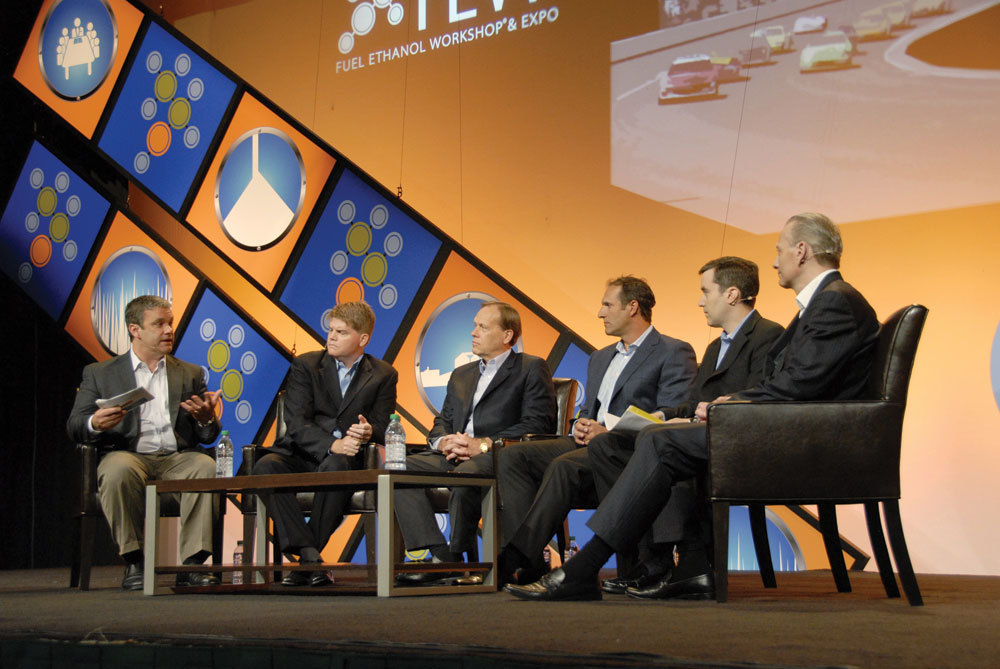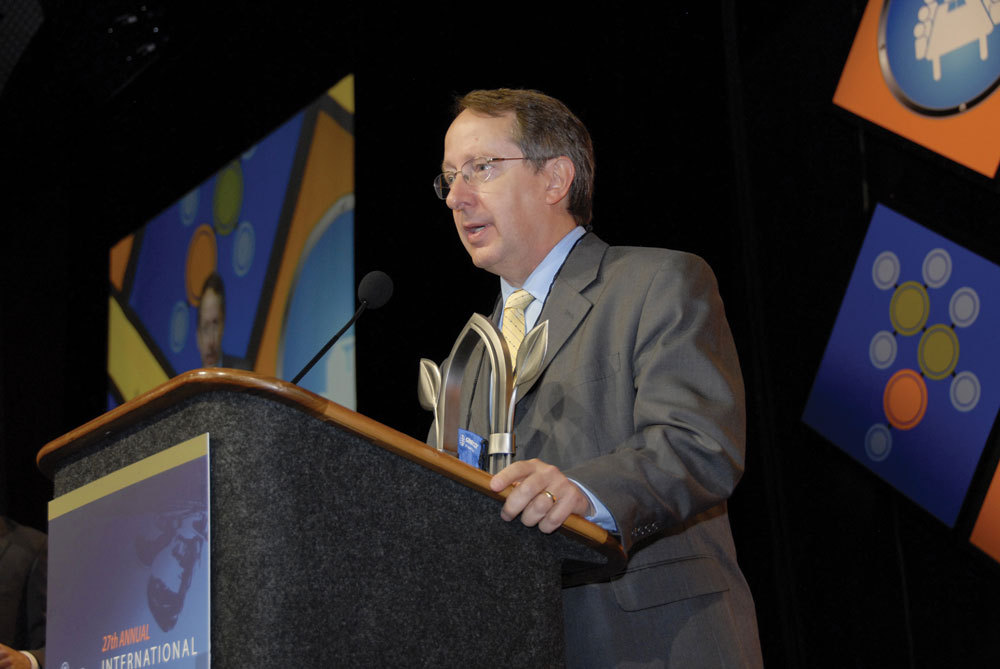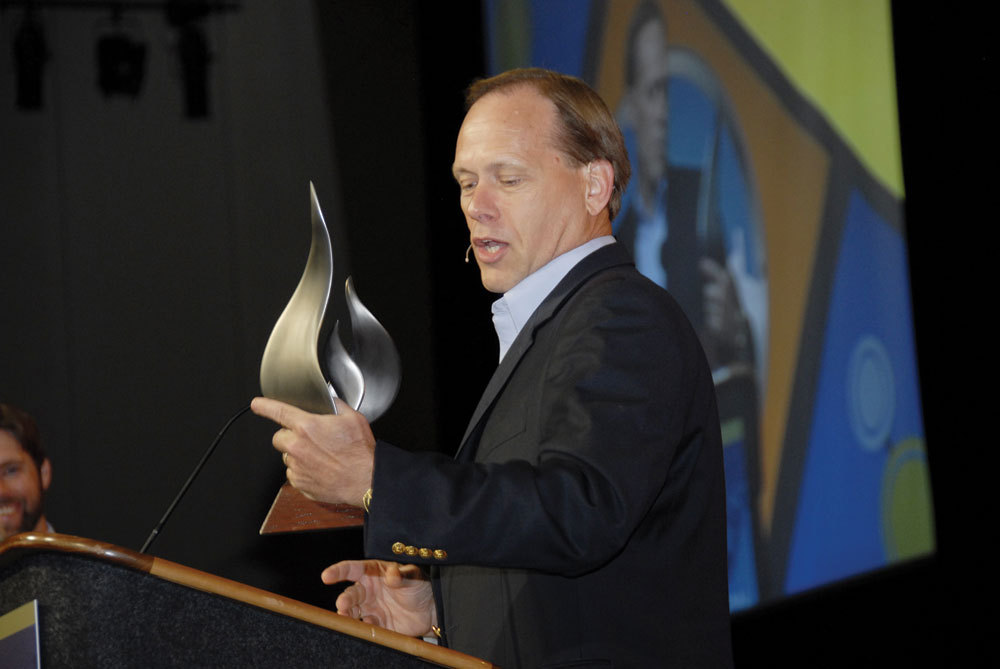2011 FEW Review






July 21, 2011
BY Holly Jessen, Kris Bevill, Ron Kotrba and Susanne Retka Schill
The International Fuel Ethanol Workshop & Expo is well-known for its top-notch networking opportunities and technically oriented panel sessions, but it also provides an opportunity for like-minded people to come together and celebrate the industry’s accomplishments in the face of diverse opposition.
This year’s event was no exception to the rule. Once again, the industry has made significant accomplishments over the past year and, again, anti-ethanol groups are waging war against what they see as a detriment to their own interests. Presentations both mornings of the FEW addressed different aspects of these accomplishments. The first was a keynote conversation between Growth Energy CEO Tom Buis and NASCAR CEO Brian France. The second morning Renewable Fuels Association President and CEO Bob Dinneen spoke.
Uniting to Face Opposition
In Dinneen’s keynote, he offered an inspiring message to the hundreds of ethanol plant employees at the conference and the thousands more who were back at their respective plants producing renewable fuel for the nation’s transportation system. “We’re always going to have a pretty strong base of support,” he assured the audience, “but don’t be mistaken—we’re always going to have well-funded, well-heeled, highly motivated opponents.”
The ethanol industry is represented on the policy front by an “ethanol alliance” consisting of the RFA, Growth Energy, the American Coalition for Ethanol and the National Corn Growers Association, but Dinneen made clear that the grassroots support, which established the industry, will continue to be required in order for ethanol to remain successful. “Education is all of our jobs,” he said. “We all need to correct the notion that it takes more energy to produce a gallon of ethanol than you get out of it. We need to dispel the notion that somehow we’re driving the price of food while people ignore the skyrocketing prices of oil and ignore the role of speculators in commodity markets. We need to be the responsible ones and do that sort of thing. It will be a challenge for all of us. But we need to do that. We need to show some outrage about the one-sided debate that’s going on in Washington today.”
Complex issues currently facing the industry include federal financial support, lack of infrastructure and flex-fuel vehicles, and the ever-present opposition to midlevel ethanol blends. The ethanol industry also needs to evolve for new feedstocks and technology in order to continue to displace greater amounts of petroleum, Dinneen said. “That will not happen if we all just sit around our own breakfast tables, venting frustration with what’s going on in Washington,” he said. “I ask for your help, because we certainly need it. Everybody needs to be a part of this fight. I need you to make the magic happen again. You need to help us make it happen in D.C. and awaken them to the growing threat that we face by the failure to immediately address our energy issues.”
Countering the Myth Machine
While Dinneen’s remarks covered the challenges in Washington, the general sessions on the first day showcased American Ethanol’s new venture into the world of racing. Several years ago, when NASCAR first started considering using ethanol in its race cars, the myths began flying thick and fast. Ethanol ruins engines. There’s a significant mileage loss. Ethanol is to blame for rising food costs. Every piece of misinformation the ethanol industry has ever battled against, NASCAR heard it, said Brian France, chairman and CEO.
Advertisement
Advertisement
In spite of the opposition, NASCAR decided to do its own investigation into ethanol. The result was the partnership of NASCAR and American Ethanol, which involves fueling every racecar with E15 and proudly displaying the American Ethanol logo on everything from the green race flags to the fuel port of each and every car. “We can be that [third-party] validator to help you get some of those myths just absolutely squashed,” France told the crowd. “And we can help you from a visibility standpoint—we race with millions of people watching. Your product, your fuel is in the cars every weekend.”
France’s message was delivered during a keynote conversation with Buis on the first full day of FEW. Following that, a panel of speakers representing NASCAR as well as the National Corn Growers Association, Poet LLC and Novozymes, all supporting organizations of American Ethanol, drilled into the details of the partnership between the two.
E15 hasn’t caused a single problem for NASCAR, France said. In fact, it’s a higher combustion fuel that provides increased horsepower and only a slight decrease in mileage. “This fuel has been a great fuel for NASCAR and we’re happy to be your partner,” he said. In turn, NASCAR provides American Ethanol with a very visible, high-impact stage to get its message out, France said. A lot of work was done by both sides to make the partnership possible. “This is a true relationship that’s going to get better,” he said. “It’s going to get bigger.”
Attendance is up at NASCAR races for the 2011 season, Buis pointed out. “Can we say that’s because of ethanol?” he asked.
“We can today—with this group,” France quipped, prompting laughter from the audience.
It all started, more than three years ago, when France mandated that NASCAR start moving in a greener direction, said Eric Nyquist, vice president of strategic development, NASCAR. Working with corporate sponsors and fans to encourage more environmentally friendly practices was the easy part. What was harder, however, was identifying something NASCAR could do that was directly attached to racing. Using ethanol as a racing fuel came to mind very quickly. However, the risk was initially perceived to be way too high, considering that many within NASCAR firmly believed in what they now know to be myths, which is why, at that point, Nyquist saw the chances of NASCAR using ethanol as zero. “This is what our entire business was built around, was performance on the track,” he said. “There was no chance that we were going to introduce something into that vehicle, if in way, shape or form it had any chance of compromising our racing product.”
Despite the perceived difficulties of using ethanol, Nyquist decided to do a little more research. He flew to Sioux Falls, S.D., where he met with Poet LLC’s CEO Jeff Broin and Greg Breukelman, senior vice president of communications. That is when, Nyquist said, he learned the truth about ethanol—something he considers somewhat shameful, considering the Minnesota native “grew up within spitting distance” of an ethanol plant.
That was the beginning of a two- or three-year process of education for NASCAR’s team. At the same time NASCAR was vetting the ethanol industry, the ethanol industry was carefully considering whether a partnership with the stock car racing association would be a good move. Some were enthusiastic while others were skeptical, said Rick Tolman, CEO of the National Corn Growers Association. Although exact terms of the six-year partnership have not been released, Tolman did say the commitment is a “substantial investment financially” on the part of American Ethanol. Though it’s always difficult to “pry open the wallets of farmers,” Tolman considers it a very worthwhile partnership. “This could be a game changer,” he said.
Advertisement
Advertisement
Several speakers, including Tolman, talked about the power the partnership has to debunk the myth that ethanol damages engines. “When you can say that the most sophisticated engines in the world—800 horsepower, $100,000 vehicles are running on ethanol and the pit crews and the crew chiefs and the race drivers are saying, ‘This is good stuff, it works, we’re supportive of it,’ that puts that argument to rest,” Tolman said.
Breukelman talked about the power of NASCAR’s use of E15 in validating that specific fuel. Although there are more hoops to jump through to bring E15 to the marketplace, Poet felt it was an ideal time for NASCAR to start using the 15 percent blend so closely following the U.S. EPA’s approval of the E15 waiver. “We just couldn’t think of any other way to validate E15 as a high performance fuel than NASCAR,” he said.
NASCAR is known for having many commercial sponsors and branding that is very visible on the track. The unique thing about American Ethanol, however, is that it’s truly a partnership rather than just a sponsorship, said Norris Scott, vice president of partnership marketing and business solutions for NASCAR. In addition, it’s not a partnership with a single ethanol plant or company; it’s a partnership with an entire industry. Key elements of that partnership, besides the fuel in every race car, are the green flags waved at the start and restart of every race and the green circles around the gas tank covers of every car. That puts American Ethanol in the position of being the first to have branding on the flags and one of only a few with logos on every car. “To someone that doesn’t know NASCAR, that might not seem like a big deal,” he said. “But there are hundreds of sponsors in the sport and there are only a handful of sponsors that literally have branding on every car, so it’s a very unique position, something that we think will, over time, have much more of an impact on our fans.”
—Holly Jessen and Kris Bevill
FEW Photos by Shawn Williams
Additional 2011 FEW Review Articles:
Cellulosic Ethanol Ready Now
Track 1 Cellulosic Ethanol: Room for Debate
Track 2 Management: It's Not Just About the Money
Track 3 Coproducts/Product Diversification: Enhancement & Diversity
Track 4 Production: Tuning it Up
Upcoming Events





